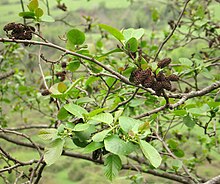Alnus subcordata
| Alnus subcordata | |
|---|---|

| |
| In Azerbaijan | |
| Scientific classification | |
| Kingdom: | Plantae |
| Clade: | Tracheophytes |
| Clade: | Angiosperms |
| Clade: | Eudicots |
| Clade: | Rosids |
| Order: | Fagales |
| Family: | Betulaceae |
| Genus: | Alnus |
| Subgenus: | Alnus subg. Alnus |
| Species: | A. subcordata
|
| Binomial name | |
| Alnus subcordata | |
Alnus subcordata, the Caucasian alder,[1] is a species in the family Betulaceae, prevalent in the Hyrcanian woodlands situated in the Caspian Mountains of northern Iran and southeast Azerbaijan.[2][3] It is closely related to the Italian alder (A. cordata) and Alnus orientalis.[1]
It thrives across altitudes from sea level up to 2000 meters. This tree exhibits rapid growth in its natural habitat, predominantly river valleys. While it showcases adaptability to a diverse range of ecological conditions, it also demonstrates an ability to flourish in various growth habitats, particularly those at higher elevations.[3]
It is a deciduous tree growing to 15–25 m tall, with similar glossy green cordate leaves 5–15 cm long. The flowers are catkins, the male catkins very slender, 8–15 cm long, the female catkins small, maturing into a woody cone-like fruit 2–3 cm long containing numerous small winged seeds.[citation needed]
Two varieties have been recorded:[4]
- Alnus subcordata var. subcordata C.A. Mey.
- Alnus subcordata var. villosa (Regel) H.J.P.Winkl
Uses
[edit]It is a commercially valuable species with "widespread application in timber and furniture industries".[2] It has a calorific value of about 4.6 cal/g.[citation needed]
References
[edit]- ^ a b Colagar, A. H., Yousefzadeh, H., Shayanmehr, F., Jalali, S. G., Zare, H., & Tippery, N. P. (2016). Molecular taxonomy of Hyrcanian Alnus using nuclear ribosomal ITS and chloroplast trnH-psbA DNA barcode markers. Systematics and biodiversity, 14(1), 88–101. http://www.tandfonline.com/doi/abs/10.1080/14772000.2015.1102172
- ^ a b Rahimi, D., Kartoolinejad, D., Nourmohammadi, K., & Naghdi, R. (2016). Increasing drought resistance of Alnus subcordata CA Mey. seeds using a nano priming technique with multi-walled carbon nanotubes. Journal of Forest Science, 62(6), 269–278. https://www.agriculturejournals.cz/publicFiles/15_2016-JFS.pdf
- ^ a b Sjöman, Henrik; Levinsson, Anna; Emilsson, Tobias; Ibrahimova, Aida; Alizade, Valida; Douglas, Philip; Wiström, Björn (2021). "Evaluation of Alnus subcordata for urban environments through assessment of drought and flooding tolerance". Dendrobiology. 85: 39–50. doi:10.12657/denbio.085.005. ISSN 1641-1307.
- ^ Shayanmehr, F., JalaliI, S., Hosseinzadeh Colagar, A., Yousefzadeh, H., & Zare, H. (2015). Pollen morphology of the genus Alnus mill. In hyrcanian forests, north of iran. Applied ecology and environmental research, 13(3), 833–847. https://doi.org/10.15666/aeer/1303_833847
